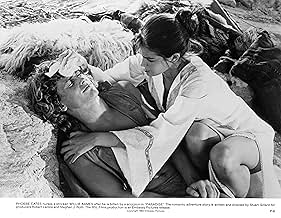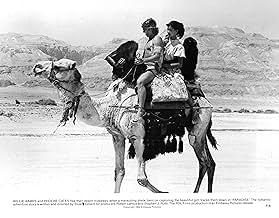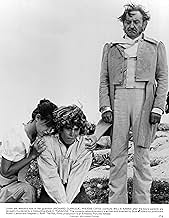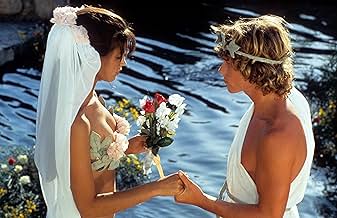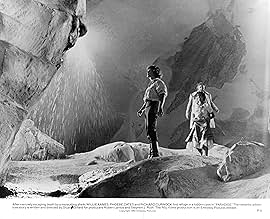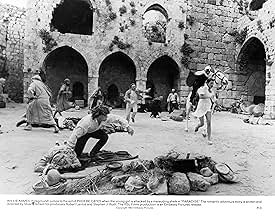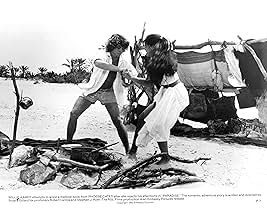In the Middle East in 1823, two teenagers seek refuge at an oasis, where they discover love and intimacy while staying one step ahead of the slaver who massacred their families.In the Middle East in 1823, two teenagers seek refuge at an oasis, where they discover love and intimacy while staying one step ahead of the slaver who massacred their families.In the Middle East in 1823, two teenagers seek refuge at an oasis, where they discover love and intimacy while staying one step ahead of the slaver who massacred their families.
- Awards
- 1 nomination total
- Director
- Writer
- All cast & crew
- Production, box office & more at IMDbPro
Featured reviews
The two young people are in Bagdad of 1823 then part of the Ottoman Empire and governed rather loosely from Istanbul. Cates is with her guardian who is your proper British official and Aames is the son of a bible thumping reverend and his wife. All of these people haven't a clue about where they're at, just an exaggerated sense of western superiority.
But the beautiful and nubile Cates has caught the attention of a sheik who's in the slave trade. He could get some good bucks for her or keep her as private stock. He and his people ambush the caravan, but the kids escape and come to a hidden oasis where they set up and play house.
The similarities to the Blue Lagoon are rather obvious even in the looks of the protagonists. But whereas those kids had been shipwrecked on their island since they were still in single digits in The Blue Lagoon, in Paradise these two young people already know the facts of life, it's just that they have that Protestant Christian upbringing.
The film was shot in Israel and the scenery is magnificent with and without Aames and Cates. Given that Aames is now a born again Christian he probably wants those male nude shots off the market, so hang on to your DVDs and VHSs.
Admittedly, the story is silly and predictable. ALso, for me, I identify W. Aames with Charles in Charge, where he was the perpetual dummy. I realize it's just a role, but it's hard for me to see him as a woman's version of a sex symbol.
But the story aside, the photography and surroundings are beautiful, as of course is P. Cates. And since most of us can now get movies for free from the local library, or virtually free from the usual sources, it's worth an hour, just don't have unrealistic expectations. (BTW, it's not as if Blue Lagoon was an artistic masterpiece either, just a little less silly than Paradise.
As many others have pointed out, this film borrows heavily from the Blue Lagoon but somehow manages to strip the emotion and warmth out of the formula.
I wandered through this movie totally oblivious to the death of the parental characters and I audibly yawned when Joffrey the minder died. Too much time is spent wasted on ridiculously stupid chimp scenes which one could over-intellectualise and proclaim as being a raw and uninhibited metaphor of the lives of Sarah and David, but in reality are there for cheap gags. As a result the movie seems too short even though you get the distinct feeling you have been sitting, watching it for a long time.
The continuity and time-span of Paradise seems horribly distorted. By the end of the movie you would swear that the two "cast-aways" had been lost out in the desert sea for no more than a couple of weeks. However, when Sarah conceives a child (towards the end of the movie) and she feels it kick in her womb (perhaps 20 minutes later) , you realise that the time span of the movie has been horribly compressed. As a result, I was left feeling baffled and rather surreal. There was no sense of extended isolation, self discovery or sincere empathy towards the characters as they never really seem to be in danger. Similarly, Paradise does not, nay cannot emulate the irony of Return to the Blue Lagoon, where Civilization is portrayed as the great destroyer or unmaker. The characters in The Blue Lagoon are wholly dependent on their little island, where as the oasis in Paradise seems like nothing more than a stop-over enroute. It's sad that it is nothing more than a rip off of The Blue Lagoon that misses the critical factors that made The Blue Lagoon so good.... but that's what it is.
In reality there is only one reason why you would want to watch this movie, and that is for the nude scenes of Phoebe Cates.. and trust me, they give the movie legs.
Has-been, limply acted, dramatically empty and totally unconvincing period piece derived from "Blue Lagoon"; a curiously halting succession of Asian adventure and adolescent sex in breathtaking locations. Only for lovers of antique teenage romance and beautifully photographed pictures of tropical nature.
Did you know
- TriviaStar Phoebe Cates has said of this film: "I was only 17 when I did my nude scenes in 'Paradise'. They were serious and more difficult because they were not easily justified. But the topless scene in Ça chauffe au lycée Ridgemont (1982) was funny, which made it easy".
- GoofsDespite playing a British character, Phoebe Cates has no trace of British accent.
- Quotes
Sarah: [Sarah is looking through a medical textbook and comes across an illustration of a nude adult male, noticing his penis]
[giggles]
Sarah: You look funny!
David: So do you.
David: [He notices what Sarah is looking at] We shouldn't be looking at this.
Sarah: Why not?
David: It could be sin.
Sarah: [Regarding the male penis] But they're beautiful! How can looking at something so beautiful be a sin?
- Alternate versionsThe Japanese DVD blurs over the scene of Willie Aames' full frontal nudity.
- ConnectionsFeatured in 'Paradise' on Fox Commercial (1989)
- SoundtracksParadise Theme
Sung by Phoebe Cates
Written and Produced by Joel Diamond and L. Russell Brown
Available on Columbia Records
- How long is Paradise?Powered by Alexa
Details
- Release date
- Country of origin
- Language
- Also known as
- Paraíso
- Filming locations
- Tel Aviv, Israel(environs, turkish mosque)
- Production companies
- See more company credits at IMDbPro
Box office
- Budget
- CA$3,500,000 (estimated)
- Gross US & Canada
- $5,588,800
- Opening weekend US & Canada
- $2,815,503
- May 9, 1982
- Gross worldwide
- $5,588,800
Contribute to this page



